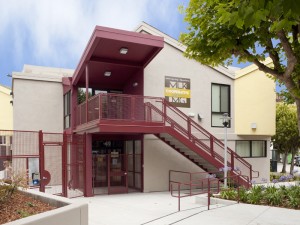
by Aaron Tilley
After more than 40 years of providing affordable housing in the Western Addition, the Martin Luther King-Marcus Garvey Square Cooperative Apartments was falling apart by 2008.
The 211-unit apartment complex wasn’t being cared for. Nonresidents were misusing the property for criminal activity. As a result, the Department of Housing and Urban Development office was close to revoking the Section 8 housing status that helped subsidize the co-op’s rent. HUD also insured the mortgage loan on the co-op, but with the loan’s subordinate debt, HUD would have foreclosed on the property if the co-op were unable to pay.
“They had serious lapses in how they operated the facility,” remembered HUD Director Thomas Azumbrado. “We issued management reviews, and there were serious violations. And unless they took corrective actions, we were going to have to take adverse actions.”
The property is unusual in that residents lease their apartments using Section 8 vouchers to offset the cost of the rent, but the rent payment goes toward giving residents a limited ownership stake in the property, and their share of ownership increases over time.
Right as the property was on the verge of being foreclosed, then-Mayor Gavin Newsom and U.S. Representative Nancy Pelosi came out as strong advocates for preserving the property as affordable housing and worked to facilitate discussions with the local HUD office.
But before the three-year renovation could get underway, there were some serious trust issues to be overcome. King-Garvey residents and board members felt that the initial idea to finance the $45.45 million renovation partly using low-income tax credits was going to result in a loss of control for residents.
‘’The rehabilitation was protested because residents thought the redevelopment agency and developer were conspiring to go against their interests,” said Olson Lee, who was then deputy executive director of housing at the San Francisco Redevelopment Agency and currently the director of the Mayor’s Office of Housing.
So instead, the co-op board chose a developer on the project that could assist in doing the necessary upgrades to maintain the Section 8 status while preserving the collective ownership. That developer, Related Cos. of California, was instrumental in doing the necessary community building “to ensure that this was going to be in the community’s interest,” said Lee.
“We had to (provide) a comfort level that renovations weren’t going to result in displacement,” said Bill Witte, president of Related California. “There certainly were a lot of meetings, mostly with residents.”
Eventually, funding was cobbled together in a way that respected the ownership structure – first with a $5 million loan from the San Francisco Redevelopment Agency followed by Citi Community Capital working with Freddie Mac to get a $36 million loan. Related California also agreed to act as a guarantor on $6 million of the loan.
The renovations that followed included updating building code requirements, completely refurbishing common areas, repairing heavy water damage, fixing exteriors and adding new playgrounds, a laundry facility and a community center with day-care services. The renovation was designed to improve security by limiting access to the buildings and eliminating places to hide, said Lisa Gelfand, the principal at Gelfand Partners Architects, which was the project’s architect.
“The development went (from) night (to) day. It’s absolutely stunning in terms of the change that happened,” said Lee. ‘’After its darkest hour, they had the good leadership that basically said, ‘We’re going to do this,’ and agreed to go forward with a developer and new loans.”
Since redevelopment agencies – which traditionally supported affordable housing – have now been axed due to a state law, this renovation helps preserve affordable housing at a time when new affordable housing will be more difficult to build.
“This is one successful example of how to maintain affordable housing and solve a bunch of issues, but more importantly as a way to provide permanent housing,” said Gelfand. “The renovations have meant a 20-year renewal of the Section 8 contract.”
Said Witte, “In a city with the gentrification tensions of San Francisco, this had a larger-than-life symbolism for the preservation of affordable housing.”